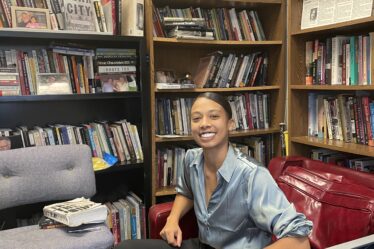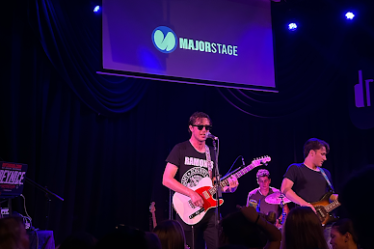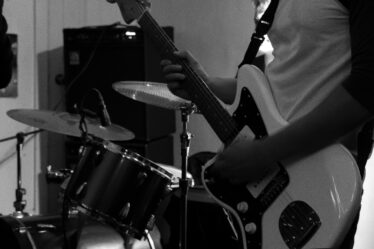
By, Kate Caperan
Conor Cary is a junior at Fordham University who has turned his passion for DJing and electronic music into a non-profit online radio station. This station highlights DJs across New York City and even beyond to other continents. Although Cary started DJing in middle school, it took him years to discover his passion, sound, and resultant dedication to DJing.
It wasn’t until he got to Fordham that Cary began to hone his craft. Bringing a single roundtable with him to college to play for friends, Cary received positive feedback from his peers after they heard him perform. Cary then realized that he really wanted to dive into DJing, and also connect with other DJs.
Cary recalled thinking, “I really enjoy this, and I want to make a platform to share music and to hopefully bring other DJs aboard. That’s when I built Flow Radio One.”
With the help of his friend, Noah Glynn, who coded and designed the platform’s website, Cary created Flow Radio One at the end of his freshman year.
At first, Cary was mostly playing sets for his friends. “It was a very intimate thing,” Cary reflects. “I had like four to five friends that would listen and tune in. I’d broadcast like once or twice a month.”
As he continued to build his station, Cary simultaneously found his sound. During his sophomore year, Cary dove into different genres of dance music, surfacing his love for disco and boogie music of the 1970s and 80s. Cary credits his mother and aunt for his love of this music. Both of them had experienced club culture during this time period and introduced Cary to the music of their youth.
Cary became fascinated with this early dance music, not only because of the infectious rhythms, but because of the historical significance of these genres. Dance genres like disco became soundtracks for the gay rights movement, becoming a soundscape for inclusivity, liberation, and celebration. Derived from soul and funk, dance music also originated in Black and Latinx communities. Many have been surprised by this fact, including Cary, based on the current mainstream association of whiteness and electronic dance music.
“I didn’t understand that Black and Latinx artists were the originators of this dance music”, Cary said. “I grew up listening to Avicci and Tiesto, bigger names in EDM, thinking this is such a white music genre.”
Once he started to learn about the empowering and underwritten history of electronic dance music, Cary wanted to learn as much as he could about the intersection of this music and history.
Cary dove into various books and articles, stating, “the historical aspect was interesting and got me to take this very seriously cuz I realized I wasn’t just doing something for fun. There’s also a social and historical component that is overlooked. This music was exported out of black communities and appropriated by other people.”
His interest in this 1970s and 80s dance music led to Cary experimenting and expanding his DJ mixes to other genres that originated from disco, such as electro, techno, house, and hip hop.
After loads of research and experimentation, Cary found his sound: 1980s and 90s dance music that came out of New York, Chicago, and Detroit. Equipped with his sound and radio station, Cary dedicated himself to expanding Flow Radio One.
Flow Radio One began hosting live DJ sets regularly. Eventually incorporating pre-recorded mixes through an automated system, DJs from all over have been able to showcase their mixes on Flow Radio One.
Currently, three DJs from Germany perform weekly, providing listeners an insight into the German and European contemporary techno scenes. Flow Radio One also currently has various Fordham student DJs mixing regularly, including MaTiK!, Clark Welecki, PrettyStar, Cat Both, and Cary.
Flow Radio One already has an impressive 30 episodes on its site’s archive, and Cary is just getting started on this project. In the long term, Cary hopes to have a self-sustained station with daily programming and a blog containing artists profiles and interviews. Cary hopes that Flow Radio One can be utilized as another source outside of social media as a more private space where DJs can curate their own content, and lay their artistic choices out for interested listeners to explore.
Make sure to check out Flow Radio One and listen to mixes by Cary and other DJs at Fordham and Beyond!
And Check out Flow Radio One | @flowradio.one for past and future mixes.



